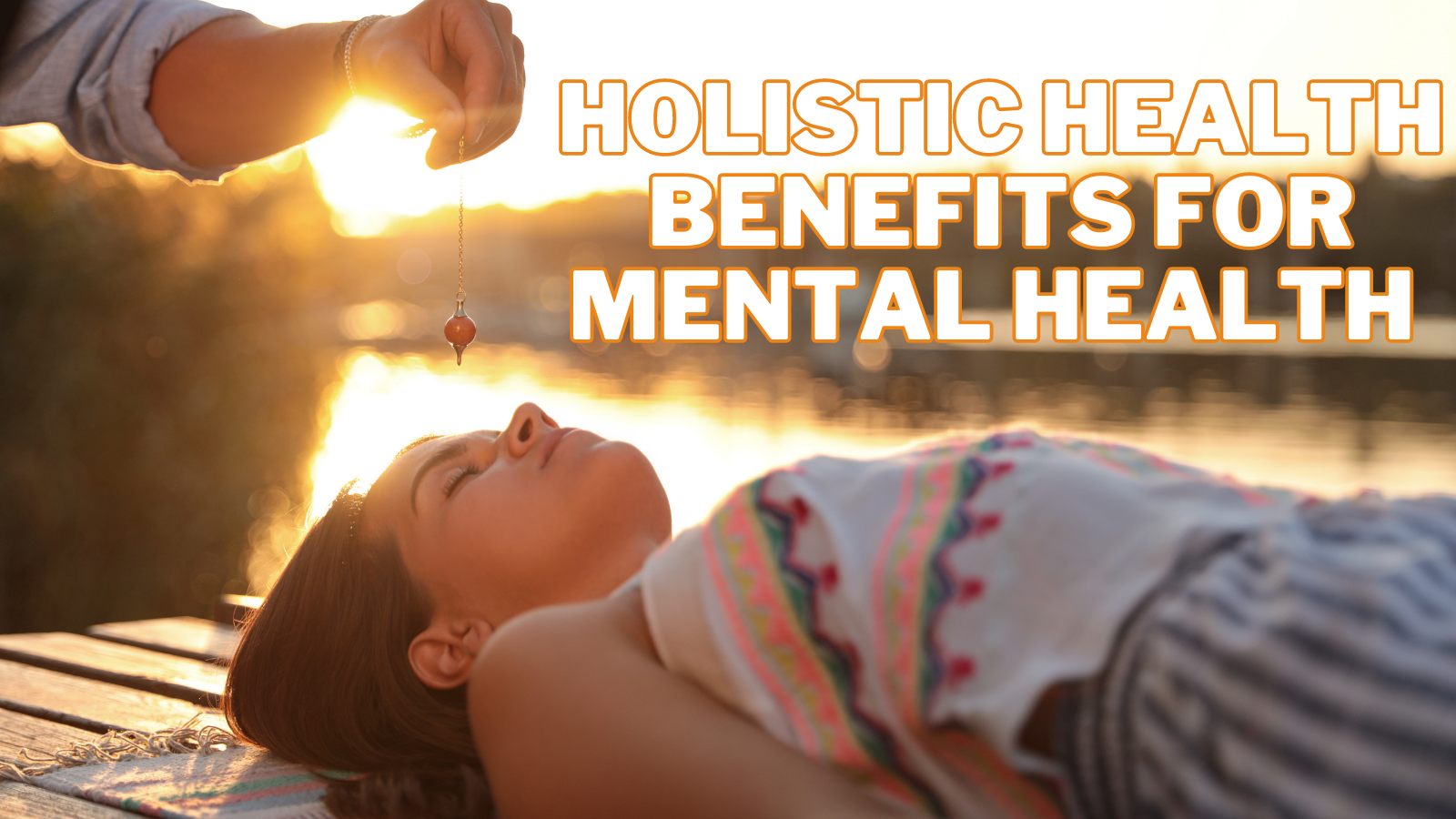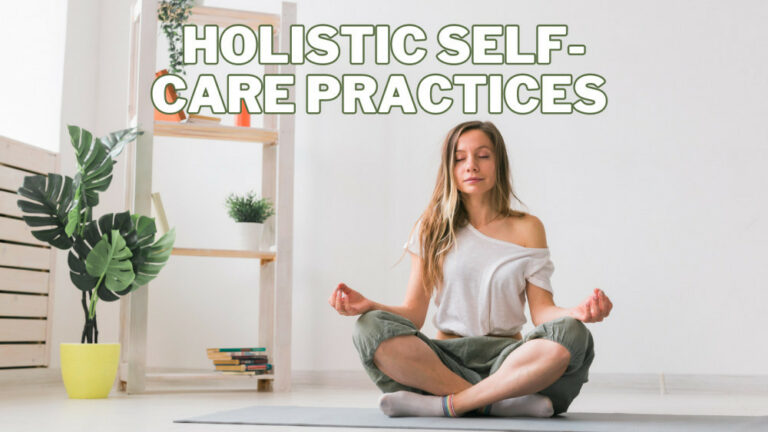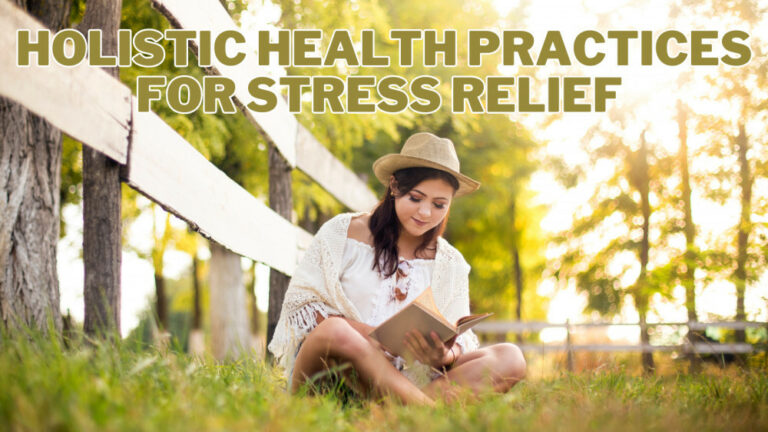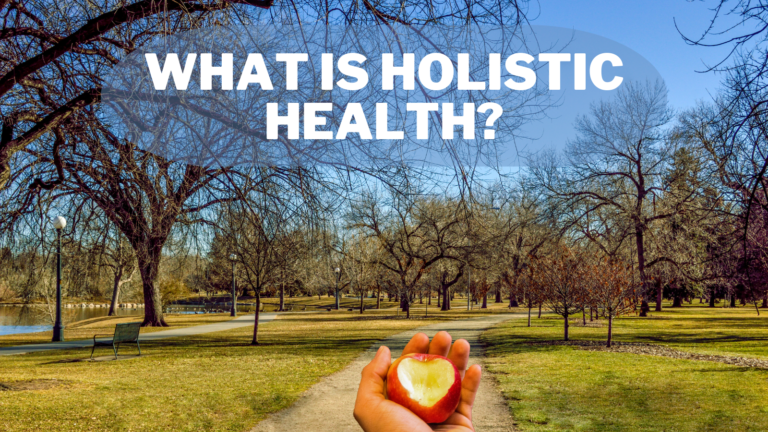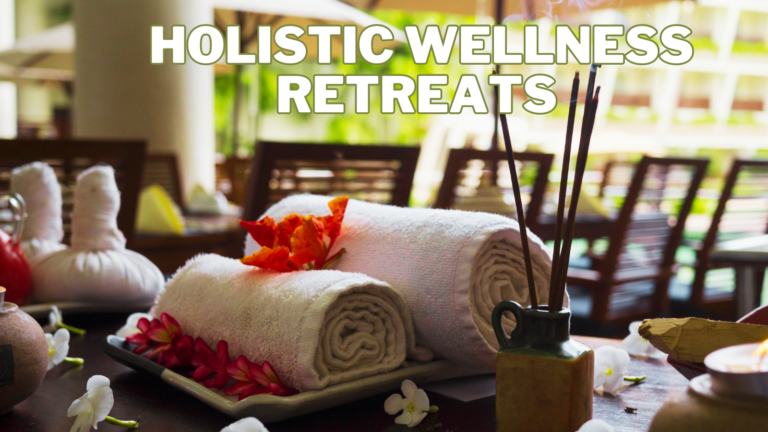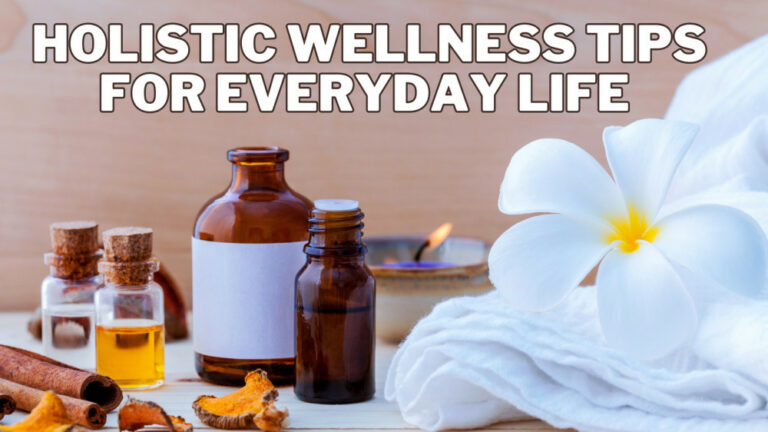Best Holistic Health Benefits For Mental Health
Best Holistic Health Benefits For Mental Health
The deep link between physical, mental, and emotional health acknowledges the deep connection between physical, mental, and emotional health is accepted by holistic health.
Holistic techniques consider the entire individual, addressing the root causes and symptoms of mental health concerns.
Holistic health can significantly promote mental well-being by adopting a complete strategy incorporating nutrition, lifestyle decisions, stress management, and emotional well-being.
In this article, we will examine the different advantages that holistic health practices have for improving mental health and promoting general well-being.
Relation Between Holistic Health And Mental Health
The term “holistic health” refers to obtaining comprehensive wellness that considers how the mind, body, and spirit are interconnected.
It highlights how crucial it is to address every facet of a person's health to foster balance and harmony. Conversely, mental health specializes in an individual's psychological and emotional well-being.
Since complete holistic well-being depends on a healthy mental state, holistic and mental health are strongly associated.
The physical, mental, emotional, and spiritual facets of a person's health are all considered when we discuss holistic health.
Any of these areas can be neglected without causing imbalances or making it more difficult to achieve maximum well-being.
A person's physical, mental, and emotional well-being are all interrelated, as is acknowledged by holistic health. Mental, psychological, and physical health problems are often correlated.
Chronic physical discomfort, for instance, might exacerbate depression or anxiety, whereas stress and mental distress can cause physical symptoms.
Holistic health understands a direct connection between the mind and body. Physical symptoms, including headaches, gastrointestinal issues, or sleep disturbances, could indicate mental health issues.
Mental health issues can also be caused by illnesses that make one anxious, stressed, or depressed.
Stress is placed on lifestyle choices that can affect mental health in holistic health. These include diet, physical activity, rest, stress reduction, and interpersonal relationships.
Healthy habits help maintain balance and general well-being by supporting physical and mental well-being.
One important component of holistic health focused on mental health is emotional well-being. Our emotional mood can affect our physical condition and significantly influence our health.
Mindfulness, meditation, and therapy can address and manage emotional issues, enhancing mental health and general well-being.
Regarding mental health, holistic health strongly emphasizes the value of attending to the full individual and their particular requirements.
It understands that promoting mental health involves a more comprehensive approach that takes the individual as a whole and goes beyond simply treating symptoms or attending to specific disorders.
A holistic approach encourages self-care, stress management, emotional control, social support, and self-reflection, all crucial for preserving and enhancing mental health.
To support mental health, holistic health offers various methodologies and treatments. A few examples of these include aromatherapy, massage treatment, acupuncture, and other complementary or alternative therapies.
Mental and emotional health, relaxation, stress reduction, and self-awareness should be improved. Holistic health and mental health are interconnected and mutually beneficial.
Holistic Health Benefits For Mental Health
There are several advantages of holistic health for mental health. Here are some specifics on how holistic methods can assist and improve mental well-being:
1. Stress Reduction
In various ways, holistic practices might improve mental health, including providing useful stress-reducing skills. Focusing on the present moment consciously and without passing judgment is the practice of mindfulness.
Through mindfulness meditation, people can develop the ability to observe their feelings and thoughts without being emotionally involved in them, which lowers stress and fosters a sense of peace.
Deep breathing activities like diaphragmatic breathing trigger the body's relaxation response, which lowers blood pressure and heart rate. Doing so can bring on a relaxed mood and aid in combat the physiological impacts of stress.
Yoga incorporates physical poses, breathing techniques, and meditation to encourage relaxation and stress alleviation. The hormone cortisol, linked to stress, has been proven to be decreased by regular yoga practice.
These holistic techniques can be incorporated into daily routines to help people develop more awareness, calmness, and resilience, ultimately improving their mental health and capacity to deal with obstacles in life.
2. Emotional Control
A holistic approach can help you control your emotions better, leading to better mental and physical health. Through mindfulness exercises, people can learn to become self-aware and observe their feelings without reacting or passing judgment.
They can better understand their triggers and patterns of emotional response by becoming aware of their emotions as they arise and acknowledging them. Due to their increased awareness, they may react more intelligently and purposefully.
Meditation practices, such as loving-kindness meditation, cultivate compassion and empathy for oneself and others, promoting emotional control and resilience.
The significance of self-care is also frequently emphasized in holistic approaches, and people are encouraged to take part in activities like journaling, artistic expression, or time spent in nature that support emotional well-being.
Through these holistic techniques, people can cultivate emotional balance and gain a higher feeling of overall well-being, enhanced relationships, and mental toughness.
3. Improved Sleep
Recognizing the importance of better sleep for mental health, holistic health methods place a priority on and encourage it.
Deep breathing exercises, progressive muscle relaxation, and guided imagery are relaxation techniques that help to calm the body and mind and facilitate the shift from awake to asleep.
The body receives signals from bedtime rituals like establishing a regular sleep schedule, engaging in calming activities before bed (like reading or taking a warm bath), and setting up a quiet environment conducive to sleep.
Holistic approaches also stress the value of good sleep hygiene, which includes limiting screen time before night, abstaining from stimulants like caffeine or nicotine before bed, and making a dark room for sleeping.
A sufficient amount of restorative sleep is necessary for cognitive performance, emotional control, memory encoding, and general mental health.
By embracing these holistic methods to promote better sleep, people can benefit from increased mental acuity, emotional stability, and a greater sense of general mental well-being.

4. Enhanced Self-Care
According to holistic health, self-care is crucial in preserving and advancing mental health. Self-care activities are a means to hydrate and cultivate one's entire being, including mind, body, and spirit.
A wide range of activities catered to a person's interests and needs might be included in this. Hobbies and creative endeavours encourage relaxation and enjoyment while allowing people to express themselves.
Being outdoors lowers stress levels, improves mood, and increases general well-being. One demonstrates self-compassion by treating oneself kindly, sympathetically, and acceptingly rather than harshly judging oneself.
By placing limitations on one's obligations and responsibilities, proper boundary-setting aids in safeguarding one's mental and emotional well-being.
Recognizing and attending to one's bodily, emotional, and spiritual needs are essential to prioritizing personal needs.
Recognizing and caring for one's physical, emotional, and mental needs without feeling guilty or neglecting oneself is prioritizing individual needs.
Self-care techniques help people focus on their health, lower their risk of burnout, and feel more satisfied with their lives.
Self-care is not selfish, according to holistic health, but rather a crucial component of preserving mental health and a person's total holistic well-being.

5. Increased Resilience
Resilience, which is necessary for preserving mental health in the face of adversity, is fostered by holistic approaches significantly.
Individuals can use holistic practices as coping mechanisms to deal with trying situations and painful emotions successfully.
Self-awareness is cultivated through practices like mindfulness and meditation, which enables people to acknowledge their feelings, thoughts, and behaviours without passing judgment.
It is less likely to feel overwhelmed thanks to increased self-awareness, enabling more thoughtful and adaptive responses to stimuli. A positive mindset that encourages optimism, gratitude, and self-compassion is another focus of holistic therapies.
One can cultivate a resilient mindset and approach obstacles with greater adaptability and perseverance by reframing negative ideas and concentrating on strengths and resources.
Holistic practices encourage self-care, which promotes physical and emotional well-being. Promoting self-care is another aspect of holistic approaches that supports resilience and helps physical and emotional well-being.

6. Increased Mind-Body Connection
Due to the importance of the mind-body link in fostering mental wellness, holistic health methods emphasize development.
Yoga, tai chi, qigong exercises, physical movement, and awareness strengthen this link. Yoga combines several postures with breathing exercises, meditation, and other practices to increase self-awareness and better comprehend the mind-body connection.
A sense of harmony and balance between the mind and body is promoted through tai chi and qigong, which entail slow, deliberate motions coupled with deep breathing and concentrated attention.
Participating in these activities helps people become more aware of their body's signals, such as tension, relaxation, or exhaustion, enabling them to react to such signs.
A greater understanding of the importance of rest, participating in physical activity that makes you happy, or learning to control your breathing while under stress are just a few examples of how this improved mind-body connection can result in better self-care habits.
It is possible for people to feel less stressed, emotionally better, and have a better sense of their general mental health by fostering the mind-body connection.

7. Cultivation Of Mindfulness And Present-Moment Awareness
Mindfulness, a fundamental aspect of holistic health, is an important factor in fostering mental health. It entails developing present-moment awareness and deliberately concentrating on the here and now without judgment or attachment.
One can watch their thoughts, emotions, and bodily sensations with curiosity and acceptance when one practice mindfulness because it increases self-awareness.
This non-reactive and non-judgmental approach to one's experiences aids in escaping recurring patterns of worry, self-doubt, and rumination that can exacerbate mental anguish.
Instead, mindfulness promotes a deeper sense of inner peace, clarity, and composure by encouraging people to notice their thoughts and emotions without becoming emotionally involved.
Studies have shown regular mindfulness helps lower stress, anxiety, and depressive symptoms. It promotes the management of emotions.
It fosters emotional regulation as people become more adept at navigating their emotions and reacting to difficult circumstances with greater clarity and serenity.
Additionally, mindfulness increases resilience because it fosters acceptance and adaptability, enabling people to deal with life's obstacles and recover from failures successfully.
People who practice mindfulness regularly report feeling better mentally, having more self-awareness, and being able to engage completely in the present moment.

8. Promotion Of Social Support And Connection
The importance of social connections and support for one's mental health is acknowledged by holistic health. With the help of group activities, workshops, and classes, holistic practices frequently allow people to connect and interact with others.
Community and belonging fostered in these environments are essential for maintaining mental health.
People can connect with people who may be going through the same struggles or have similar objectives by sharing their experiences with them to get their understanding, empathy, and support.
It is possible to exchange thoughts, feelings, and experiences with others thanks to the social ties in holistic environments, which help people feel less alone and isolated.
Positive mindset maintenance and navigating challenging circumstances are made possible by supportive social networks, which provide a source of inspiration, motivation, and affirmation.
A sense of community and a platform for learning and development can be created by interacting with like-minded people travelling the same holistic health path.
Holistic health approaches promote greater mental well-being, emotional resiliency, and general quality of life by prioritizing social support and connection.

9. Empowerment And Active Engagement In Personal Health
Empowering people to participate in their health and well-being is a key component of holistic health.
It promotes the practice of self-advocacy, which entails standing up for one's interests, gathering data, and making decisions regarding one's mental health.
By encouraging people to take ownership of their choices, activities, and behaviours that impact their mental health, holistic approaches encourage self-responsibility.
This is actively engaging in self-care activities promoting mental wellness, such as regular exercise, stress reduction strategies, eating a balanced diet, and prioritizing rest.
People reclaim a sense of agency and control over their mental health by actively engaging in their health. Since people are more aware of their potential to shape their mental health, this empowerment positively affects self-esteem.
Due to the realization that they can affect their mental health outcomes, people feel more empowered, which boosts their self-esteem.
Furthermore, self-efficacy is enhanced because people become more confident in overcoming obstacles and creating positive changes.
Through their proactive and resilient mindsets, people who actively engage in their health generate a good attitude toward life.
The ability to design one's mental well-being gives people better control over their overall health and a sense of fulfillment.

10. Combining Conventional And Complementary Methods
Since different people may require other techniques for achieving their utmost well-being, holistic health recognizes the value of blending complementary and traditional treatments to mental health.
Many instruments and methods are available through holistic practices, such as mindfulness, meditation, dietary adjustments, herbal therapies, energy healing, etc.
These methods can be combined with more traditional therapies like medicine, psychotherapy, and other treatments supported by research.
Integrating these methods makes a thorough and individualized approach to mental health care possible. For instance, a patient with depression may benefit from both taking a psychiatrist-prescribed medicine and practicing mindfulness-based stress management.
Individuals can access a wider range of resources and personalize their treatment plans to meet their needs and preferences by combining complementary and traditional techniques.
This holistic approach understands that mental health has many facets and that combining different methods can offer a more thorough and efficient route to recovery and well-being.
Working with medical practitioners knowledgeable in conventional and alternative modalities is recommended to promote safe and successful integration and give people access to a comprehensive approach to mental health care.

11. Promotion Of Self-Reflection And Self-Discovery
Self-reflection and self-discovery are emphasized as crucial elements of mental well-being in the context of holistic health.
There are several ways to reflect on oneself, including journaling, meditation, and reflective exercises like self-inquiry or mindfulness.
People can better understand themselves by engaging in these techniques, which give them a safe environment to examine their ideas, feelings, values, and beliefs.
The process of self-discovery can be aided by seeking therapy or counselling, which can also help with self-reflection.
Personal growth workshops or retreats allow people to explore their inner lives, learn new perspectives, and interact with like-minded people travelling the same path of self-discovery.
Discovering one's genuine passions, purpose, and potential via self-reflection and self-discovery can result in higher self-worth, self-acceptance, and a stronger sense of belonging.
Individuals can find their true passions, purposes, and possibilities through self-reflection and self-discovery, which can improve self-esteem, self-acceptance, and mental health.
It enables people to live lives consistent with who they truly are, promoting fulfillment and personal development. To create a deeper awareness of oneself and improve their general mental well-being, holistic health urges people to go on this journey of self-reflection and self-discovery.

Conclusion
Adopting holistic medical methods can significantly enhance mental wellness. Individuals can profoundly support their mental well-being and nurture total well-being by adopting a holistic approach that considers the interdependence of the mind, body, and spirit.
Encouraging mental wellness, reducing stress and anxiety, boosting mood, and engaging in mindfulness practice and other holistic health practices, including nutrition, exercise, and mindfulness, can improve the overall quality of life.
By focusing on the root causes of mental health difficulties rather than just treating the symptoms, these methods support sustained and long-lasting rehabilitation.
When people achieve balance, inner harmony, and a sense of purpose, they are more resilient, happy, and fulfilled. Holistic health is a potent instrument to help people with this.
Holistic health can help people feel better emotionally, have less stress, be more aware of themselves, and have a greater sense of meaning and fulfillment.
Ultimately, holistic health offers a route to total mental wellness, allowing people to live honestly, thrive, and develop a profound inner sense of harmony and vigour.
I trust you enjoyed this article on the Best Holistic Health Benefits For Mental Health. Please stay tuned for more blog posts to come shortly. Take care!
JeannetteZ
>>>Please click here to read my all-inclusive article about Lessons That Will Teach You All About Stress<<<
Your Opinion Is Important To Me
Thoughts? Ideas? Questions? I would love to hear from you. Please leave your questions, experience, and remarks about the Best Holistic Health Benefits For Mental Health article in the comments below. You can also reach me by email at Jeannette@Close-To-Nature.org.
Disclosure
This post may contain affiliate links. As an Amazon Associate and other affiliate programs, I earn from qualifying purchases at no extra cost to you. Please read my full affiliate disclosure.
You might also enjoy these blog posts:
Best Tips On Stress Management Language
Best Herbal Remedies For Skin Care
Best Naturopathic Remedies For Allergies

